

What is social isolation? Written by: No Isolation Last updated: June 5, 2020 Social isolation is a term often used interchangeably with loneliness, but while the two are closely related, they do not necessarily mean the same thing.
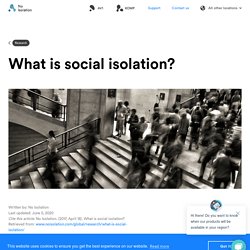
You can be lonely in a crowd, but you will not be socially isolated. Isolation has been defined as an objective state whereby the number of contacts a person has can be counted, whereas loneliness is a subjective experience. While the terms may have slightly different meanings, both can be painful experiences and have a harmful impact on the individual. Just What Older People Didn’t Need: More Isolation. When the committee looked for promising solutions, it found studies showing that attending exercise programs helped reduce isolation — not a useful approach at the moment.
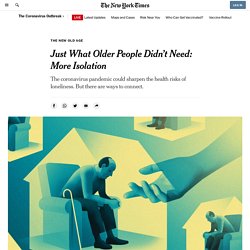
Social isolation and the elderly poor in Singapore. SINGAPORE: Her one-room flat was a cluttered mess, and Madam Helen Fernandez herself never seemed to bathe, said her neighbours who always saw her in the same set of clothes. When case workers first visited the unkempt and confused elderly widow, they had to rush her to hospital for very high blood pressure – which resulted because she hadn’t been taking her medication and had been missing doctors’ appointments. Since her husband died 17 years ago, Mdm Fernandez had been living alone with no friends or family – and slowly falling prey to loneliness and dementia. There were times when she’d even call up the police just to talk. It was how her case got referred to the Social Service Office, and then to case worker Ahmala Rajoo in 2015. “She was receiving financial assistance, about S$500 a month,” said Ms Ahmala, a care executive with NTUC Health Cluster Support in Bukit Merah.
But the neatly-groomed Mdm Fernandez you meet today almost doesn’t seem the same person. “Her memory has worsened. Social isolation: The COVID-19 pandemic's hidden health risk for older adults, and how to manage it. The consequences of socially isolating seniors - TMC News. As social creatures, humans are naturally hardwired to seek companionship and social connection, but COVID-19 is forcing people to adapt to a new reality anchored by social distancing and isolation. :::::::::::::::::::::::::::::::::::::::::::::::::::::::::::::::::::::::::::::::::::::::::::::::::::::::::::::::::::::::::::::::::::::::::::::::::::::: Looking for the latest on the CORONAVIRUS?
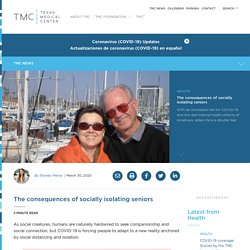
Read our daily updates HERE. :::::::::::::::::::::::::::::::::::::::::::::::::::::::::::::::::::::::::::::::::::::::::::::::::::::::::::::::::::::::::::::::::::::::::::::::::::::: Social distancing is critical to managing the coronavirus pandemic, as it will help flatten the curve and prevent the United States health care system from collapse. “They’re very worried. Loneliness and Social Isolation Linked to Serious Health Conditions. Social isolation was associated with about a 50% increased risk of dementia and other serious medical conditions.
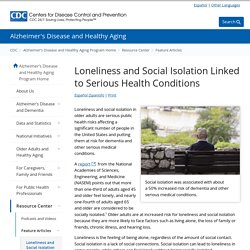
Loneliness and social isolation in older adults are serious public health risks affecting a significant number of people in the United States and putting them at risk for dementia and other serious medical conditions. A new reportexternal icon from the National Academies of Sciences, Engineering, and Medicine (NASEM) points out that more than one-third of adults aged 45 and older feel lonely, and nearly one-fourth of adults aged 65 and older are considered to be socially isolated.1 Older adults are at increased risk for loneliness and social isolation because they are more likely to face factors such as living alone, the loss of family or friends, chronic illness, and hearing loss.
Loneliness is the feeling being alone, regardless of the amount of social contact. Social isolation puts elderly at health risk. ANN ARBOR—One in five elderly adults is socially isolated from family or friends, increasing their risks for poor mental and physical health, as well as higher rates of mortality, according to a University of Michigan study.
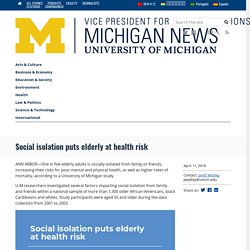
U-M researchers investigated several factors impacting social isolation from family and friends within a national sample of more than 1,300 older African-Americans, black Caribbeans and whites. Study participants were aged 55 and older during the data collection from 2001 to 2003. Overall, most elderly were connected to both family and friends (77 percent), while 11 percent were isolated from friends only and 7 percent were isolated from family members only. Of concern, however, were the 5 percent of elderly who were socially isolated from both family and friends, which may place them at risk for physical and mental health problems, the researchers say.
Men were more likely than women to be socially isolated. The findings appear in the journal Healthcare. How Social Isolation Affects the Brain. Daisy Fancourt was at her home in Surrey in southeast England when the UK government formally announced a nationwide lockdown.
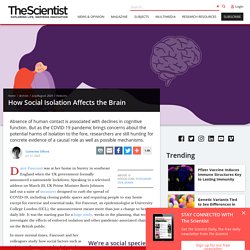
Speaking in a televised address on March 23, UK Prime Minister Boris Johnson laid out a suite of measures designed to curb the spread of COVID-19, including closing public spaces and requiring people to stay home except for exercise and essential tasks. For Fancourt, an epidemiologist at University College London (UCL), the announcement meant more than just a change to her daily life. It was the starting gun for a huge study, weeks in the planning, that would investigate the effects of enforced isolation and other pandemic-associated changes on the British public. We’re a social species. We really need others to survive. How to Prevent Social Isolation from Making Loneliness Worse - COVID-19 - Johns Hopkins Bloomberg School of Public Health. By Brian W.
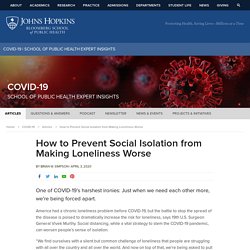
Simpson | April 3, 2020 One of COVID-19’s harshest ironies: Just when we need each other more, we’re being forced apart. America had a chronic loneliness problem before COVID-19, but the battle to stop the spread of the disease is poised to dramatically increase the risk for loneliness, says 19th U.S. Surgeon General Vivek Murthy. Social distancing, while a vital strategy to stem the COVID-19 pandemic, can worsen people’s sense of isolation. “We find ourselves with a silent but common challenge of loneliness that people are struggling with all over the country and all over the world. Murthy knows loneliness. More than 20% of Americans reported that they often or always feel lonely in a 2018 Kaiser Family Foundation study.
Tackling a silent beast : Strategies for reducing loneliness and social isolation. Nobody relishes the thought of getting older with no one at their side to provide support, love, and laughter through good times and bad.
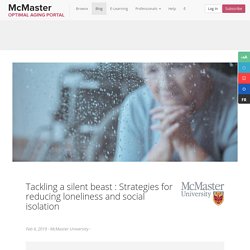
Unfortunately, about 40% of older adults experience loneliness, while 7-17% report being socially isolated.